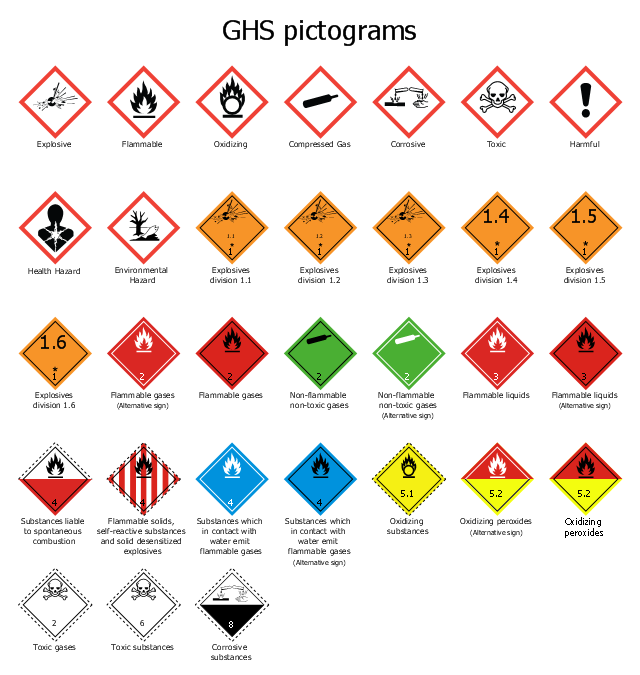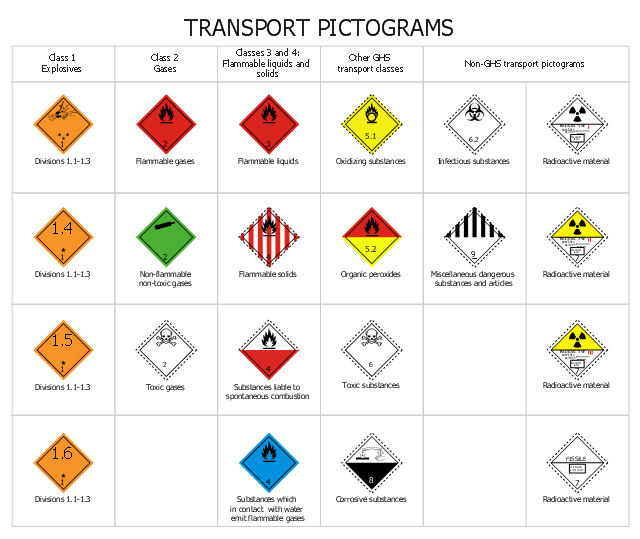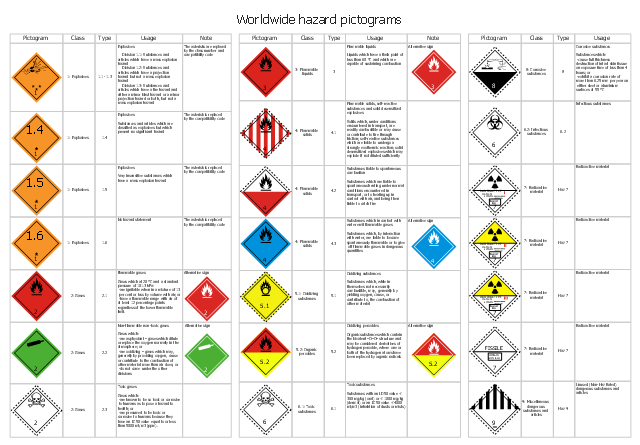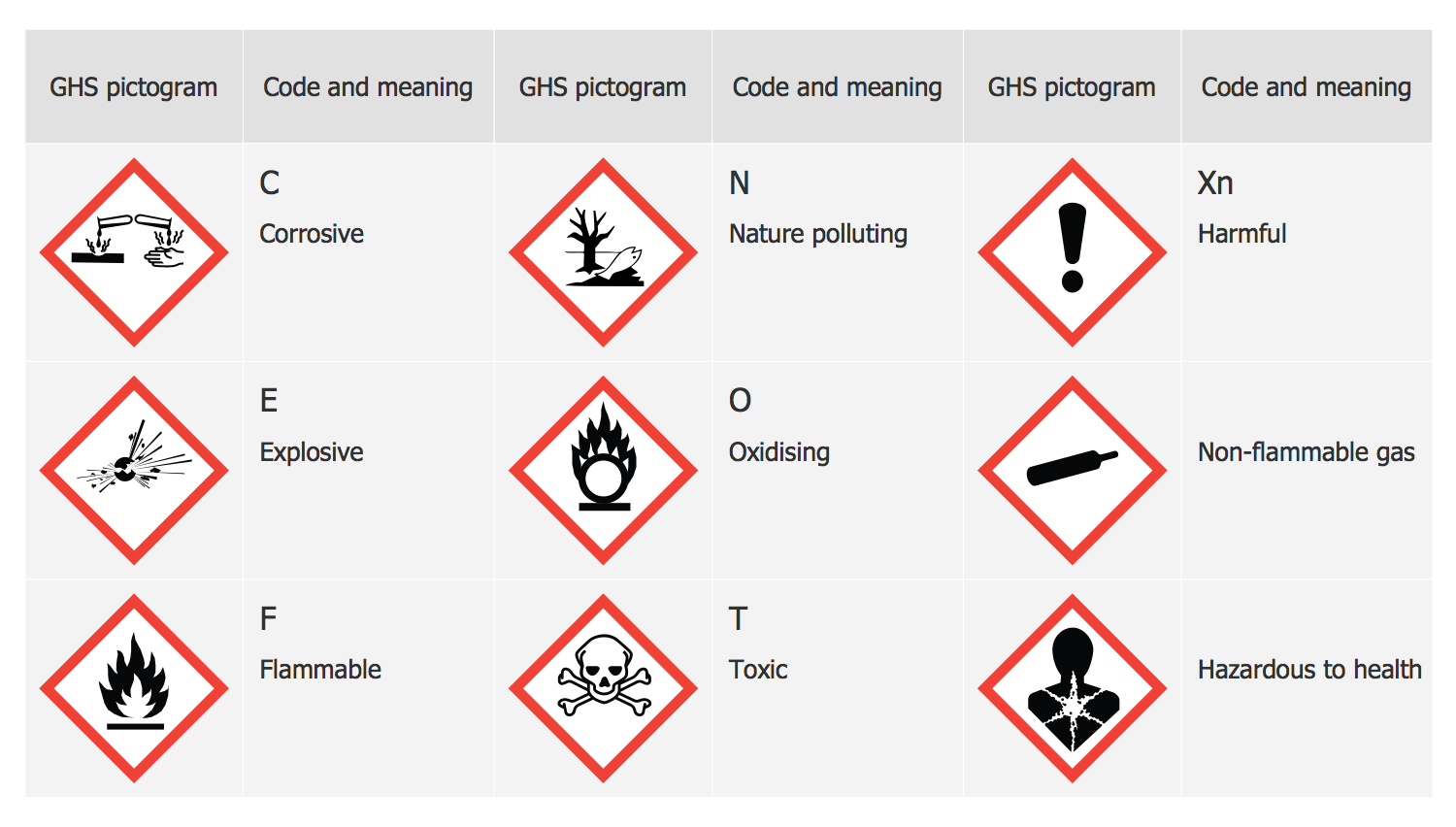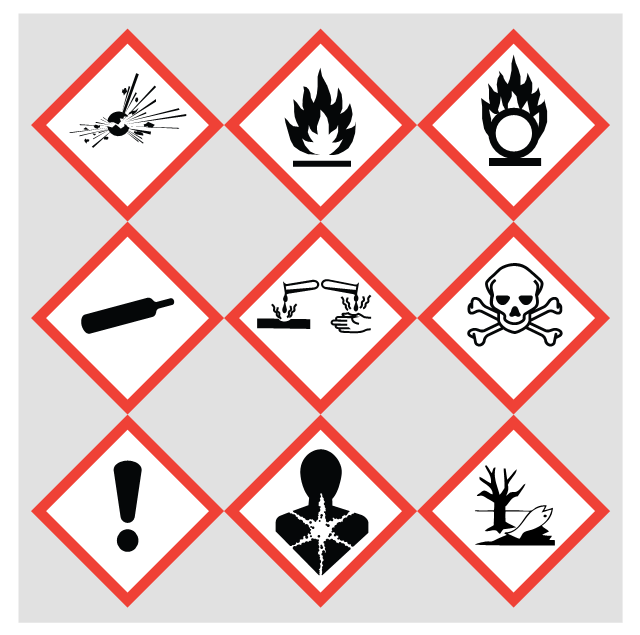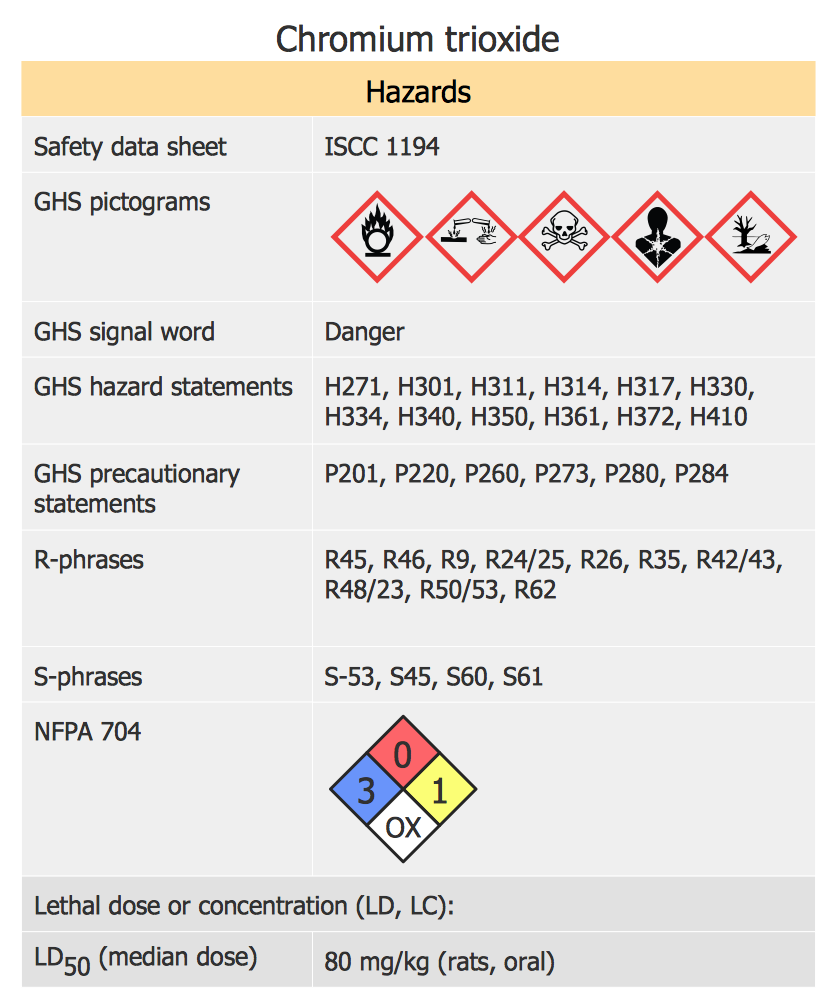This chemical safety infographic shows the GHS hazard pictograms.
"Hazard pictograms are one of the key elements for the labelling of containers under the GHS, along with:
* an identification of the product;
* a signal word – either Danger or Warning – where necessary
* hazard statements, indicating the nature and degree of the risks posed by the product
* precautionary statements, indicating how the product should be handled to minimize risks to the user (as well as to other people and the general environment)
* the identity of the supplier (who might be a manufacturer or importer)" [GHS hazard pictograms. Wikipedia]
The transport hazard symbols infographic example "GHS pictograms" was designed using ConceptDraw PRO software extended with the Transport Hazard Pictograms solution from the Engineering area of ConceptDraw Solution Park.
"Hazard pictograms are one of the key elements for the labelling of containers under the GHS, along with:
* an identification of the product;
* a signal word – either Danger or Warning – where necessary
* hazard statements, indicating the nature and degree of the risks posed by the product
* precautionary statements, indicating how the product should be handled to minimize risks to the user (as well as to other people and the general environment)
* the identity of the supplier (who might be a manufacturer or importer)" [GHS hazard pictograms. Wikipedia]
The transport hazard symbols infographic example "GHS pictograms" was designed using ConceptDraw PRO software extended with the Transport Hazard Pictograms solution from the Engineering area of ConceptDraw Solution Park.
 GHS Hazard Pictograms
GHS Hazard Pictograms
GHS Hazard Pictograms solution contains the set of predesigned standard GHS pictograms, Hazardous symbols, and Hazard communication pictograms, approved and agreed by UN in Globally Harmonized System of Classification and Labelling of Chemicals (GHS). They can be used for quick and simple designing accurate and professional-looking infographics, diagrams, warning announcements, signboards, posters, precautionary declarations, regulatory documents, and for representing the main items of OSHA HAZCOM Standard.
 Transport Hazard Pictograms
Transport Hazard Pictograms
Transport Hazard Pictograms solution includes large variety of specially developed samples with transport hazard symbols and pictograms, and the whole set of predesigned vector transport GHS pictograms download and used with ease from the Transport Hazard Pictograms library. Apply them for quick designing professional-looking infographics and diagrams, use them to create warning signboards and announcements on all stages of the transportation process, to place them on the transport vehicles and warehouses of transportation companies, at the transport documentation and on the websites of transport and logistics companies.
This transportation safety infographic shows the hazard pictograms for Class 1 Explosives, Class 2 Gases, Class 3 Flammable liquids, Class 4 Flammable solids, Class 5 Oxidizers, Class 6 Toxic substances, Class 7 Radioactive materials, Class 8 Corrosive substances, Class 9 Miscellaneous dangerous substances.
The GHS hazard symbols infographic example "Transport pictograms" was designed using ConceptDraw PRO software extended with the Transport Hazard Pictograms solution from the Engineering area of ConceptDraw Solution Park.
The GHS hazard symbols infographic example "Transport pictograms" was designed using ConceptDraw PRO software extended with the Transport Hazard Pictograms solution from the Engineering area of ConceptDraw Solution Park.
This transportation safety infographic shows the Worldwide hazard pictograms.
"Dangerous goods or hazardous goods are solids, liquids, or gases that can harm people, other living organisms, property, or the environment. They are often subject to chemical regulations. In the United States, United Kingdom and sometimes in Canada, dangerous goods are more commonly known as hazardous materials (abbreviated as HAZMAT or hazmat). Hazmat teams are personnel specially trained to handle dangerous goods, which include materials that are radioactive, flammable, explosive, corrosive, oxidizing, asphyxiating, biohazardous, toxic, pathogenic, or allergenic. Also included are physical conditions such as compressed gases and liquids or hot materials, including all goods containing such materials or chemicals, or may have other characteristics that render them hazardous in specific circumstances." [Dangerous goods. Wikipedia]
The GHS transport symbols infographic example "Worldwide hazard pictograms" was designed using ConceptDraw PRO software extended with the Transport Hazard Pictograms solution from the Engineering area of ConceptDraw Solution Park.
"Dangerous goods or hazardous goods are solids, liquids, or gases that can harm people, other living organisms, property, or the environment. They are often subject to chemical regulations. In the United States, United Kingdom and sometimes in Canada, dangerous goods are more commonly known as hazardous materials (abbreviated as HAZMAT or hazmat). Hazmat teams are personnel specially trained to handle dangerous goods, which include materials that are radioactive, flammable, explosive, corrosive, oxidizing, asphyxiating, biohazardous, toxic, pathogenic, or allergenic. Also included are physical conditions such as compressed gases and liquids or hot materials, including all goods containing such materials or chemicals, or may have other characteristics that render them hazardous in specific circumstances." [Dangerous goods. Wikipedia]
The GHS transport symbols infographic example "Worldwide hazard pictograms" was designed using ConceptDraw PRO software extended with the Transport Hazard Pictograms solution from the Engineering area of ConceptDraw Solution Park.
GHS Label Pictograms
Hazard pictograms are those which form a part of the international GHS which is a “Globally Harmonized System of Classification and Labelling of Chemicals. Two sets of pictograms are included within the GHS: one for the labelling of containers and for workplace hazard warnings, and a second for use during the transport of dangerous goods. Either one or the other is chosen, depending on the target audience, but the two are not used together.This chemical safety infographic example shows the GHS chemical hazard pictograms poster.
It was designed on the base of the table from the Wikimedia Commons file: GHS HAZCOM Safety Labels.jpg. [commons.wikimedia.org/ wiki/ File:GHS_ HAZCOM_ Safety_ Labels.jpg]
"The Hazard Communication Standard requires employers to disclose toxic and hazardous substances in workplaces. This is related to the Worker Protection Standard.
Specifically, this requires unrestricted employee access to the Material Safety Data Sheet or equivalent, and appropriate training needed to understand health and safety risks. ...
The Globally Harmonized System of Classification and Labeling of Chemicals (GHS) is currently being pursued to standardize workplace hazard protection internationally." [Hazard Communication Standard. Wikipedia]
The chemical safety infographic sample "GHS HAZCOM Safety Labels" was created using ConceptDraw PRO software extended with the GHS Hazard Pictograms solution from the Engineering area of ConceptDraw Solution Park.
It was designed on the base of the table from the Wikimedia Commons file: GHS HAZCOM Safety Labels.jpg. [commons.wikimedia.org/ wiki/ File:GHS_ HAZCOM_ Safety_ Labels.jpg]
"The Hazard Communication Standard requires employers to disclose toxic and hazardous substances in workplaces. This is related to the Worker Protection Standard.
Specifically, this requires unrestricted employee access to the Material Safety Data Sheet or equivalent, and appropriate training needed to understand health and safety risks. ...
The Globally Harmonized System of Classification and Labeling of Chemicals (GHS) is currently being pursued to standardize workplace hazard protection internationally." [Hazard Communication Standard. Wikipedia]
The chemical safety infographic sample "GHS HAZCOM Safety Labels" was created using ConceptDraw PRO software extended with the GHS Hazard Pictograms solution from the Engineering area of ConceptDraw Solution Park.
HelpDesk
How To Design Regulatory Documents with use of Standard GHS Pictograms
A hazard pictogram is intended to provide information about the hazard that can cause damage to human health or the environment. GHS Hazard pictogram consists of a standard hazard symbol placed to the shape of a red diamond with a white background. GHS Hazard Pictograms solution from the ConceptDraw Solution Park includes the set of standardized GHS hazard pictograms. It can be used for creating safety infographics, warning announcements, labels and regulatory documentation containing the elements of OSHA HAZCOM Standard.- GHS pictograms
- Design elements - GHS hazard pictograms | GHS HAZCOM Safety ...
- GHS pictograms | GHS pictograms | Transport pictograms | Hazard ...
- Transport Hazard Pictograms | FTA diagram - Hazard analysis ...
- GHS HAZCOM Safety Labels | Design elements - GHS hazard ...
- GHS hazard symbols | GHS Hazard Pictograms | Worldwide hazard ...
- Hazard Chemical Sign | Chemical Engineering | Transport Hazard ...
- GHS hazard symbols | Design elements - GHS hazard pictograms ...
- New Transport Hazard Pictograms Solution for ConceptDraw PRO v11
- Pictogram Pdf
